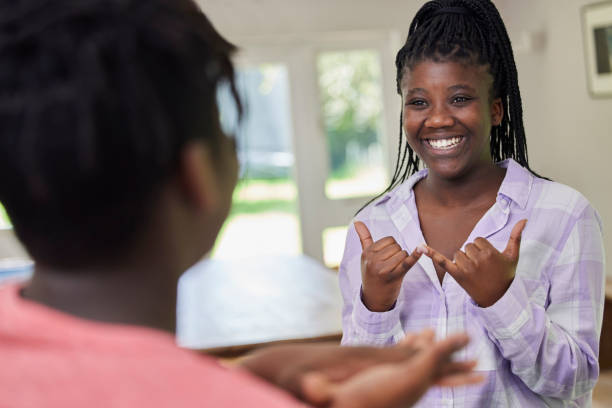Deaf Athletes
- adham elsherbini
- Mar 15, 2022
- 4 min read
Updated: Mar 16, 2022
Ever wonder how Deaf athletes are capable of adapting to their sport? Or the different types of measures that sporting businesses can take to accommodate for Deaf athletes? In every sport, Deaf and Hard of Hearing athletes have developed effective methods that allow them to compete on the largest stages alongside their hearing counterparts. The conversation of Deaf and Hard of Hearing athletes in sports is broad; from unfortunate situations like sports management fails in the case of Paul Ruff, to the success of Deaf-based teams, like the California School for the Deaf Riverside football team (CSDR). Let's take the time to understand the journey and determination of these athletes.
Paul Ruff
Paul was a senior at Gering High School in Nebraska when his wrestling state championship became national news. He lost the state title by 1 point due to the lack of communication from the referee, who knew that Paul was a Deaf athlete. The match ended 0-1 when the referee gave 2 caution warnings to Paul through verbal communication while wearing a mask.
Paul, who does not know sign language and takes off his cochlear implant for safety reasons when wrestling, relies on lip reading when in a competition. This wasn’t information to the Nebraska School Activities Association (NSAA), and yet they chose a referee that refused to lower his mask when mitigating the match. It would later be said that the NSAA purposefully picked the only referee wearing a mask at the competition. Paul Ruff’s final competitor was Paul Garcia, another highschool wrestler that was a 3-time state champion, that would go on to his fourth, making him the 34th to do so in the history of Nebraska.

Paul in Blue taking down his opponent
The Nebraska Commision for Deaf and Hard of Hearing (NCDHH) requested a rematch and formal apology from NSAA, alongside the help from the National Association for the Deaf (NAD). The American Civil Liberties Union (ACLU), founded by Helen Keller, would follow by accusing the NSAA of discrimination, asking the organization to accomodate for Deaf wrestlers by wearing see-through masks, and to provide training in equality for athletes. The NSAA met with the family and while there is no public evidence of the outcome, it is well known that Ruff’s family fough to implement accessibility and change within the school district.
CSDR football team
With a school of only 130 pupils, California School for the Deaf Riverside football team (CSDR) made national news and history when they reached their division II championship final. With only 2 seniors, the team went on to have a 12-0 run, winning their first game by 68 points.
Being the only Deaf team in the Interscholastic Federation Southern Division II, all players and coaches communicate through their native language, ASL. In fact, ASL serves as a strength and the hearing teams are unable to understand the plays that CSDR players are communicating with each other. They also conserve time by not requiring to huddle and many of them are capable of understanding their opponents body language. Very interestingly, the huddle was actually created by a Deaf quarterback, Paul Hubbard, in 1894 to hide their signing from the opponents. And when CSDR was asked about the silence in such an energetic game, the players stated that they feel the energy by looking around and seeing the waving arms.
The coach describes his team as, “not being a good Deaf football team, but a good football team.” To make the moment even more monumental, the players described the school’s previous football history as a “laughing stock”. Not only have these athletes turned their schools football history, but nearly the whole team also represents the school's basketball team. Now, CSDR prepares for their 2022 season, where they intend to win the championship.

CSDR’s Coach communicating in ASL
Deaflympics
In the summer of 2021, the 24th Deaflympics occurred in Caxia, Brazil. Here, over 6000 athletes from nearly 100 nations competed in the international sporting event organized by the International Committee on Sports for the Deaf (ICSD). The summer Deaflympics has been around for over 95 years and occurs regularly every 4 years. Recognized by the International Olympic Committee, the next winter Deaflympics will be hosted in Quebec City, Canada. The Deaflympics have a long history, from name changes to an incredible increase in competitors.

Due to the absence of Deaf-focused events in the Paralympics, Deaflympics serves as a way to celebrate and bring insight into the Deaf culture and community. The Deaflympics also alters components of the sport to guide Deaf athletes, such as using a flag or signal light rather than a whistle in soccer or track. To add, rather than clapping and cheering, v”sitors are recommended to wave their hands to show their support.
As the CSDR coach said it best, “we are not a good Deaf football team, but a good football team.” Deaf athletes are no different than their hearing counterparts. They both compete on the highest stages and find unique ways to use their abilities to get an advantage. The introduction of Deaflympics has developed a space where Deaf athletes are capable of interacting and competing in an accessible space.
Like what you read? Let us know something you learned to be entered in a draw! Note: valid for Queen's University students only. https://forms.gle/XVyKtTWH6HrA864H6
Sources:


Comments